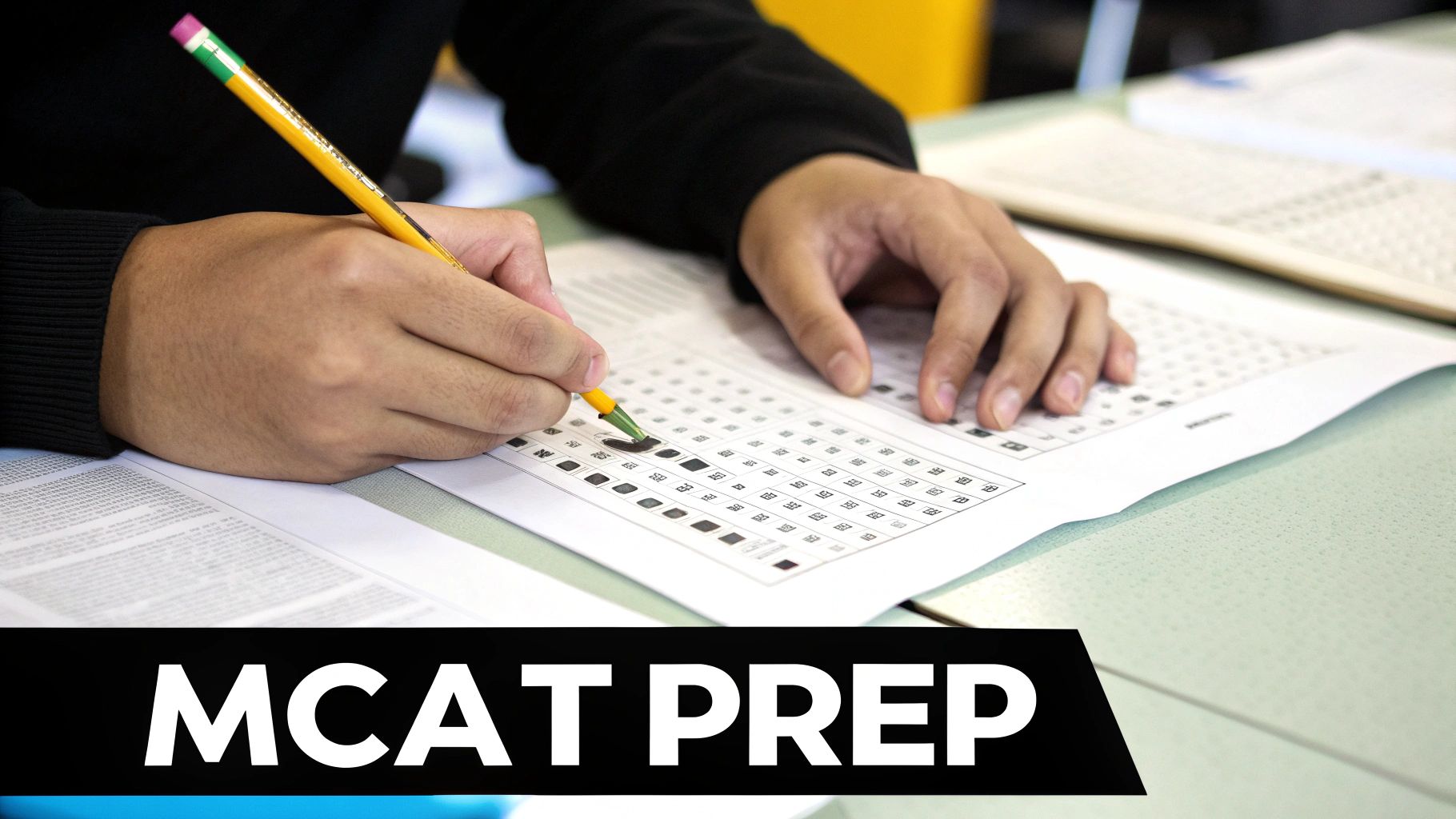Getting into medical school is a massive undertaking, and the real work begins years before you even think about hitting 'submit' on your application. Meeting the prerequisites for medical school isn't about ticking off boxes on a list; it's about methodically building the academic, experiential, and personal foundation you'll need to succeed.
Building Your Foundation for Medical School
Think of it this way: your pre-med journey is like building a house from the ground up. Every core science course, every hour of clinical volunteering, and your MCAT score—each one is a critical part of the structure. Admissions committees aren't looking for someone who just followed instructions; they want to see a candidate who truly understands why each of these pieces is essential for the grueling reality of a medical career.
This guide is your blueprint, breaking down exactly what schools are looking for:
- Academic Mastery: Proving you have the intellectual horsepower to handle an intense curriculum.
- Standardized Test Performance: Showing you can compete and excel on a national level.
- Meaningful Experiences: Demonstrating through action that you're committed, empathetic, and ready for patient care.
Figuring out this framework is the first real step in learning how to get into medical school with an application that stands out. It’s a tough road, no doubt, but with the right plan and a lot of grit, it’s completely within your reach.
Mastering the Core Science Courses
Think of your pre-med coursework as the foundation of a skyscraper. You simply can't build a strong medical career on a shaky base. This is where you prove you have the academic grit to handle the intense curriculum that lies ahead.
A deep, genuine grasp of biology is essential for understanding how the human body works, while a solid command of chemistry unlocks the secrets of how medications interact with our systems. For example, a functional understanding of antibodies and antigens isn't just a random biology topic—it's a cornerstone concept in medicine.
The Non-Negotiable Prerequisites
These core science courses aren't just suggestions; they are the absolute, non-negotiable entry requirements for virtually every medical school. An undergraduate degree packed with biology, chemistry, and physics—all with their lab components—is the global standard.
And the requirements are always evolving. To keep pace with modern medicine, around 60 medical schools now require biochemistry, a number that's likely to keep growing. Staying on top of these expectations is crucial.
This table breaks down the typical courses you'll need to complete to be a competitive applicant.
| Subject Area | Typical Requirement (Semesters) | Includes Lab Component? | Why It's Important |
|---|---|---|---|
| General Biology | 2 | Yes | Forms the foundation for understanding human anatomy, physiology, and cellular processes. |
| General Chemistry | 2 | Yes | Crucial for understanding biochemical reactions, acid-base balance, and pharmacology. |
| Organic Chemistry | 2 | Yes | Explains the structure and function of the molecules that make up the human body. |
| Biochemistry | 1-2 | Often | Bridges chemistry and biology, explaining the metabolic processes essential to life and disease. |
| Physics | 2 | Yes | Underpins the principles of medical imaging (X-rays, MRI), fluid dynamics, and biomechanics. |
| English/Writing | 2 | No | Develops the critical communication skills needed to write patient notes and research papers. |
| Mathematics | 1-2 | No | Provides the quantitative reasoning skills needed for biostatistics and interpreting research. |
This isn't just a checklist to be completed. Medical schools want to see that you've truly engaged with and excelled in these demanding subjects.

As the image shows, success in these courses requires more than just cramming for exams. It demands focused, disciplined, and consistent effort over several years. This is your first real test of commitment to a life in medicine.
The New Essentials: Biochemistry, Psychology, and Statistics
Think of your basic biology and chemistry courses as the alphabet of medicine. They give you the letters. But to truly understand the language of modern patient care, you need the grammar—and that’s where biochemistry, psychology, and statistics come in.
These subjects aren't just "recommended" anymore. They are the new essentials, largely because the MCAT has evolved to test these areas heavily. Medical schools know that a doctor who understands these fields is better prepared for the realities of the profession.

Here's a quick breakdown of why these courses are so critical:
- Biochemistry is the molecular story behind health and disease. It's the "how" and "why" of what's happening inside a patient's cells when a treatment works—or doesn't.
- Psychology provides the framework for patient interaction. It helps you understand behavior, build trust, and address the mental and emotional sides of illness, which are just as important as the physical.
- Statistics gives you the tools to be a critical thinker. It’s the key to reading a clinical study and knowing if the evidence is solid or flimsy, which is the entire basis of evidence-based medicine.
Mastering these subjects signals to admissions committees that you’re not just ready for the first day of medical school; you’re preparing for the future of medicine itself. They are absolutely core to building a competitive and truly contemporary academic profile.
Decoding Your GPA and MC-AT Score
Let’s talk numbers. Your GPA and MCAT score are two of the biggest chapters in your application story. Admissions committees lean on these metrics to get a quick read on whether you can handle the intense academic pace of medical school.
They pay particularly close attention to your science GPA (sGPA) because it’s a direct reflection of how you performed in the core prerequisite courses.

So, what’s a good number? Most competitive medical schools are looking for an overall GPA north of 3.5. The data is pretty clear: strong grades in your science prerequisites have a direct link to getting that acceptance letter.
The MCAT, on the other hand, is the great equalizer. It’s a standardized way for schools to compare applicants from wildly different undergraduate programs and grading curves. A killer MCAT score can really make your application pop, especially if your GPA had a few bumps along the way.
Ultimately, you want these numbers to paint a picture of academic consistency and capability. If your score isn't quite where you'd like it to be, don't panic. There are proven strategies for how to improve your MCAT score, and investing time there can make all the difference.
Demonstrating Your Commitment Through Experience
Top grades and a stellar MCAT score are fantastic, but they only tell part of your story. Medical schools aren't just looking for brilliant test-takers; they're searching for future physicians. This is where the holistic review process comes in, looking beyond the numbers to see your passion for medicine in action.
Your extracurriculars are where you prove it. These experiences are your chance to demonstrate the empathy, resilience, and genuine desire to serve that can't be measured by a multiple-choice exam.
Remember, quality always trumps quantity. Meaningful, long-term engagement in a few key areas will always be more impressive than a long list of superficial commitments. This philosophy is becoming more common, with schools like UCLA focusing on an applicant's entire journey rather than a rigid checklist.
Your goal is to build a compelling narrative through three key pillars of experience:
- Clinical Exposure: This is where you get direct, hands-on interaction with patients and see what the healthcare environment is really like.
- Research: This demonstrates your scientific curiosity and shows you understand the process of inquiry that drives medical advancements.
- Community Service: This shows a commitment to altruism and a heart for helping others, especially underserved populations.
Crafting Your Application Narrative
Once you’ve ticked off the academic and experiential boxes for medical school, the real challenge begins: turning all those data points into a compelling story. This is where your application narrative comes in, told primarily through your personal statement and letters of recommendation. It’s your chance to finally answer the big question: “Why do you really want to be a doctor?”
Think of your personal statement as far more than a resume in paragraph form. It’s your origin story. This is where you connect the dots between your experiences and your deep-seated motivation for a life in medicine. Your goal is to be authentic and memorable, showing the admissions committee the real person behind the grades and scores.
Your letters of recommendation, on the other hand, are the external validation of your story. You need to choose recommenders who genuinely know you and can speak to your strengths with specific, powerful examples. A generic letter won't cut it.
Think of your application as a cohesive narrative. The data—your grades and experiences—provides the plot points, but your personal statement and letters provide the essential theme and emotional arc that make your story unforgettable.
Common Questions About Medical School Prerequisites
Sorting through the requirements for medical school can feel like navigating a maze. Let's cut through the confusion and tackle some of the most common, and frankly, most stressful questions pre-meds have about the application process.
Can a Low Grade Hurt My Chances?
This is the big one. What happens if you get a C in a core prerequisite class? It's a question that keeps a lot of students up at night. While you can still apply, a C in a foundational science course can definitely raise a red flag for admissions committees. They're looking for proof that you can handle a tough science curriculum.
The best way to deal with a less-than-stellar grade is to face it head-on. Retaking the course to show you've mastered the material is a powerful move. Admissions committees also love to see a strong upward grade trend—it shows you’ve got resilience and the ability to improve.
One stumble doesn't have to derail your entire journey. It's all about how you respond. In fact, there are specific game plans for students exploring medical school acceptance with a low GPA.
Do All My Credits Need to Be From a Four-Year University?
What about those prerequisite courses you knocked out at a community college? The good news is that most medical schools will accept them. However, it's true that some of the most competitive programs might prefer to see those credits come from a four-year institution.
The safest bet is always to check the admissions websites for the specific schools on your list. If you do have community college credits, a great strategy is to balance them out by taking and excelling in challenging, upper-level science courses once you're at a four-year university.
At Ace Med Boards, we know how to turn academic challenges into application strengths. Our expert tutors offer personalized guidance to help you master your courses, crush your exams, and build the strongest application possible.
